Guppies are hugely popular tropical fish that pretty much every hobbyist has kept at some time or another. These brightly colored, active livebearers are lots of fun to keep, but what happens when you go on vacation?
The last thing you want is to leave the guppies without food, only to come home and find them dead. So, what can you do to keep your guppies alive and thriving while you’re away? And how long can guppies go without food?
Well, the length of time you can fast your guppies depends on several factors. Generally, healthy adult guppies can cope for two or three weeks without food, although that’s not ideal.
However, guppy fry is delicate and won’t survive for more than a few days without food, requiring regular daily feeds to fuel growth and healthy development. Sick and pregnant guppies should not be left without food at all.
Read this article to learn how to keep your guppies happy and healthy while you’re away, leaving you free to enjoy your downtime without worrying about your pets!
Can Guppies Go Without Food?
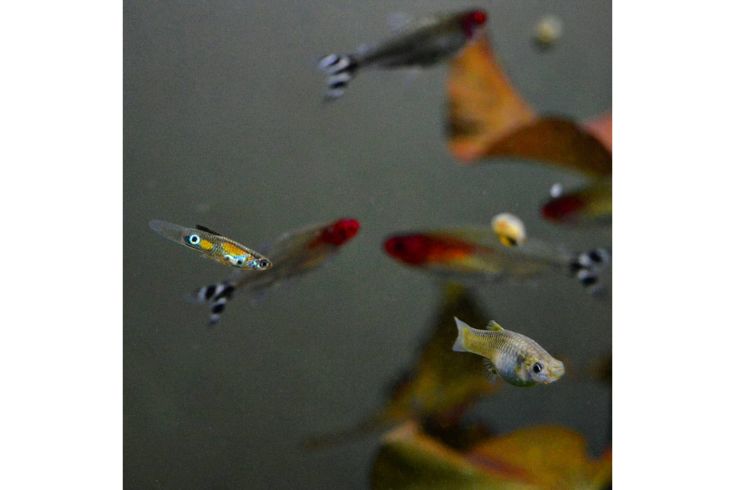
Whether or not your guppies survive a stint without food depends on several factors. Let’s take a look at some things you’ll need to consider.
Life Stage
Guppy fry are very delicate creatures. They need to be fed several times a day and can go without food for only a short period. If you’re planning to be away for more than a day, it’s best to find someone who can come by and feed your fry.
Healthy adult guppy, on the other hand, can go without food for much longer periods. Under the right circumstances, they can even fast for several weeks without ill effects, though this is not something that you should attempt regularly. One-offs are fine, but fasting should not become a regular part of your guppy care routine.
General Health
Like us humans, guppies are more likely to survive a fast if they’re already healthy. If your guppies are suffering from any illnesses or have any other health problems, you should not attempt to fast them. Fish in poor health need proper nutrition and care, as this will boost their ability to fight off infection and disease.
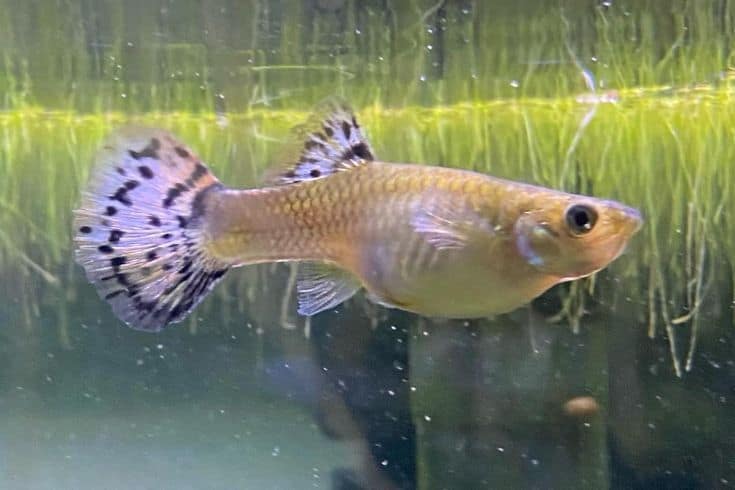
If you’re not sure whether or not your guppies are healthy, it’s always best to err on the side of caution. If you’re unsure, don’t fast them; instead, find someone who can come and feed them while you’re away.
Availability of Alternative Food Sources
As omnivores, guppies need a varied diet to stay healthy. In the wild, they would graze on algae, small insects, and other tiny food sources. In captivity, most hobbyists try to meet their needs by providing high-quality food several times a day, thus eliminating the need for pet guppies to forage. When you’re away, however, your guppies may need to forage for their food.
If additional food sources are available in your fish tank, such as algae or small insects, your guppies will have better odds of surviving a fast. This is because they’re not starving themselves completely over an extended period; rather, they’re just not being fed as frequently as usual.
How Long Can Guppies Go Without Food?
All this talk about guppies surviving a fast may have you wondering: how long can guppies go without food? Generally speaking, healthy guppies can go 2-3 weeks without food. Going without food for weeks isn’t the best idea, but it’s good to know that your guppies can survive if needed.
Guppy fry, on the other hand, will likely only survive days without food. The exponential growth rate of fry means they require frequent feeding at this critical life stage. When they are deprived of the nutrients they need, they will quickly succumb to starvation.
Guppies That Should Not Be Left Without Food
Along the same lines, some guppies should not be left without food. If any of the following describes your guppy, you should not try to fast them:
- Pregnant Female Guppy: The same way humans need extra nutrients when pregnant, as do guppies. Starving a pregnant guppy is a surefire way to kill both the mother and her fry.
- Guppies in Poor Health: Nobody wants to see their guppies sick, but it happens. If your guppy is already sick, the last thing they need is to be deprived of food.
- Baby Guppies: Baby guppies, or fry, are incredibly delicate creatures. They must be fed frequently – at least 3 times a day – and should not be left without food for more than a few hours.
Preparing Your Guppy Tank Before Going On Vacation
We’ve already stressed the importance of having someone feeding your guppies while you’re gone, but if you ever find yourself in a pinch, there are a few things you can do to give your fish the best chance of surviving a fast.
Clean Your Filter Before Leaving
First and foremost, catch up on filter maintenance. Whether you have a sponge filter or a canister filter, it’s a good idea to clean it before you go on vacation. A dirty filter can quickly lead to nitrite and ammonia spikes, which, to put it bluntly, is what causes many vacation-goers to end up with dead guppies in their tank.
Keeping your aquarium filter clean will also increase its effectiveness. Picture a sponge that’s been sitting in dirty water for weeks. Now picture a sponge that was just rinsed off. The clean sponge will do a much better job of filtering your water and keeping your guppies healthy. It will also boost your tank’s ability to cope with the reduced frequency of water changes while you’re away.
To clean your filter, simply remove it from your tank and rinse the media in old aquarium water. If you have a canister filter, you’ll also need to disassemble the unit and clean the tubes. Doing this before you go on a vacation will help keep your guppies healthy while you’re away.
Perform A Water Change
While we’re on the subject of keeping your tank healthy, it’s also a good idea to perform a water change before you go on vacation. A water change will help remove any dissolved organic compounds (DOCs) that have built up in your tank over time. These compounds can contribute to increased ammonia and nitrate levels, which can be deadly for your pet fish.
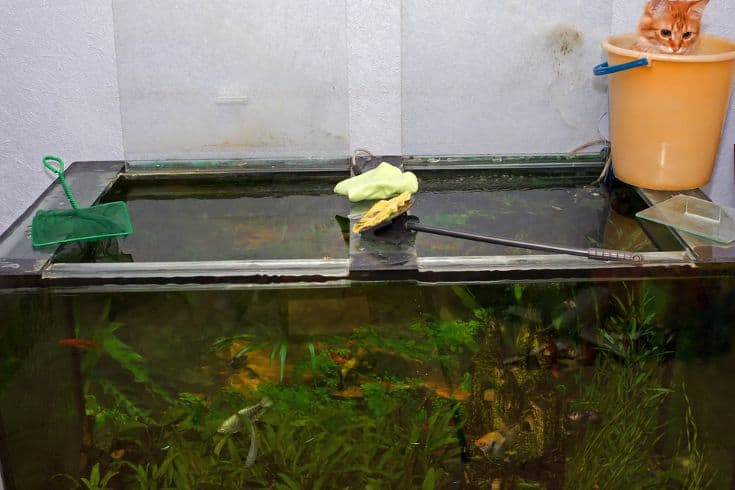
We recommend performing a water change of at least 50% if you’ve been doing water changes of around 30%. If you usually do 50%, opt for something higher, like 70%. The idea here is to do a water change that’s slightly larger than usual without shocking your fish. This gives your tank a little bit of a head start in terms of water quality while you’re away.
Of course, if you’re leaving for an extended period of time – a month or more – you’ll need to take some additional steps to ensure your fish are well cared for. In this case, we recommend asking a friend or family member to check on your fish and perform regular water changes while you’re gone.
Install A Timer
Automatic timers are the unsung heroes of the aquarium world. They help maintain a natural light cycle for your plants, which makes it easy to keep your tank running like clockwork, even when you’re not there. Most people use timers to turn their aquarium lights on and off, but you can also use them to trigger a tank heater or fan if you experience extreme temperature fluctuations.
When setting up a timer for your aquarium, it’s important to keep a few things in mind. First, you’ll need to determine the length of your light cycle. Most aquariums should have a 12-hour light cycle, which mimics the natural day/night cycle. Second, you’ll need to ensure that the timer is properly plugged into a power outlet and that it’s set to the correct time.
Because technical and manufacturing problems can occur with any type of product, we recommend investing in a high-quality timer. Test your timer over a week-long period to make sure it’s working properly before relying on it to turn your aquarium lights on and off while you’re away. This gives you time to come up with a contingency plan if you need one!
Remove Organic Waste
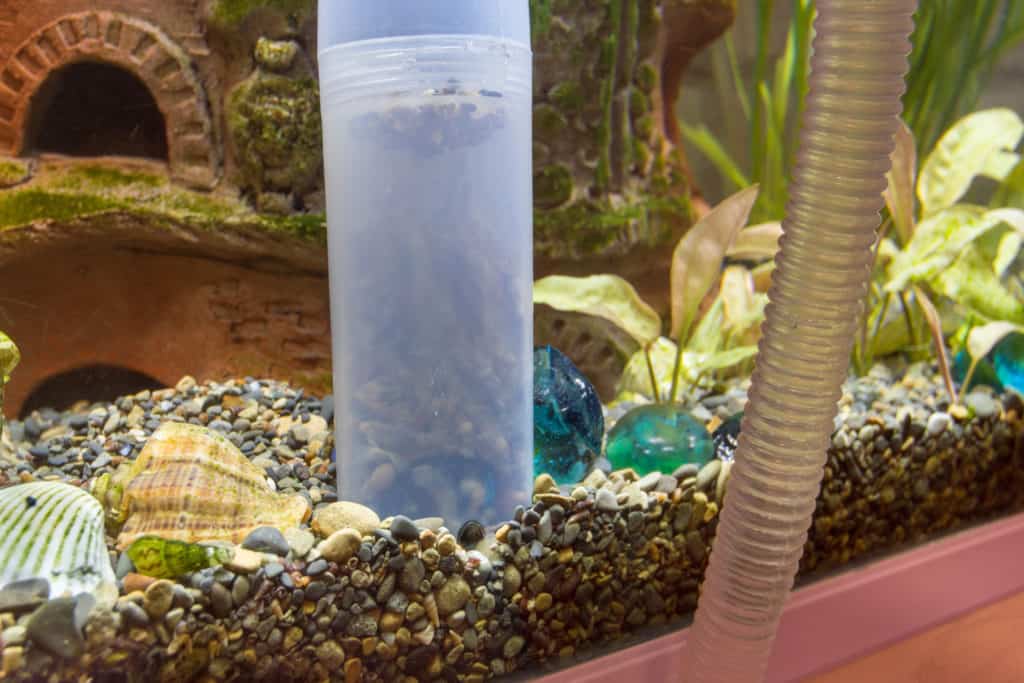
Did you know that uneaten food and fish waste are two of aquarium’s biggest sources of ammonia? Chemically speaking, ammonia is produced when organic matter breaks down in the water. Any kind of organic matter – even something seemingly harmless like dead leaves, uneaten fish food, or fish waste – can release ammonia into your tank.
The good news is that there are plenty of ways to remove organic waste from your aquarium. The easiest way is to install a protein skimmer, which helps remove dissolved organic matter from your water. You can also add live plants to your tank, as they absorb ammonia and other nutrients from the water. Finally, you can use a siphon or gravel vacuum to clean your gravel bed.
Guppies may be hardy fish, but even they can’t tolerate high levels of ammonia for long. Removing organic waste from your aquarium can help keep poor tank conditions at bay while you’re away. Ammonia poisoning is more common than you might think, so it’s important to take any necessary precautions to prevent it.
Consider Moving Your Guppies Into A Larger Tank
Given their tiny body mass, guppy fish don’t usually require a lot of space to thrive. In fact, most guppy owners house their fish in a 10 or 20 gallon tank. But in their natural habitats, these fish often live in much larger ponds or streams. They’re just as happy in an outdoor pond as they are in a painstakingly aquascaped nano tank with three other fish!
So what does this have to do with you? If you’re leaving your guppies alone for an extended period, you may want to consider moving them into a larger tank. A larger tank will be more forgiving towards water quality fluctuations and will give your fish more space to swim around. If aggressive tank mates have been an issue, a larger tank will also give your guppies more space to avoid them.
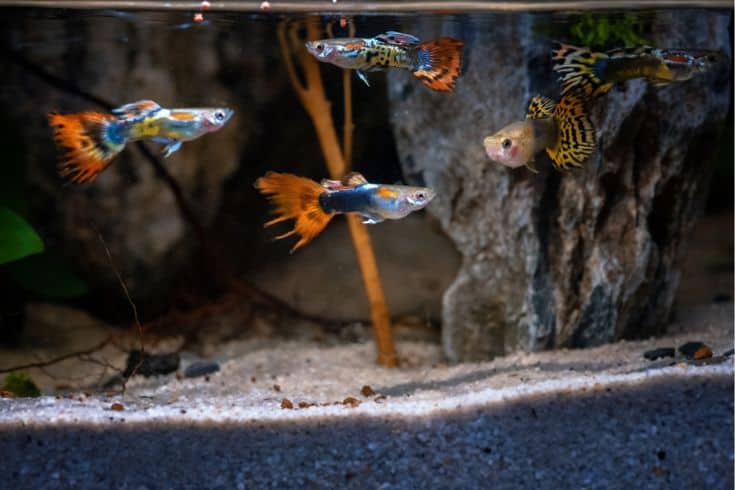
Of course, you’ll need to do some additional research before moving your guppies into a larger tank or pond. Make sure that any differences in water quality are accounted for, and acclimate your fish to their new environment slowly and carefully. But if you have the space and the resources, moving your guppies into a larger tank may be the best way to keep them healthy and happy while you’re away.
Phone A Friend!
The best solution to feeding and caring for your fish while you’re away is to ask a good friend with fishkeeping experience to look after your pets. That’s what I generally do.
Of course, you should ensure the tank is clean and the filter and heater are working correctly before you go, but a friend who could pop in to feed and check on your fish every day is the perfect solution to the vacation problem.
I’m very lucky in that I have a friend who also has a fish tank. He lives five minutes away from my house, so he’s able to call by on his way home from work and feed my fish for me if I’m away.
We have a reciprocal arrangement, so when he goes away, I keep an eye on his fish for him, although he has an automatic feeder that he sets up before he leaves. Of course, I’m there as a backup should the feeder malfunction.
Should You Use An Automated Feeder? Pros and Cons
How Automated Fish Feeders Work
An automated fish feeder is a device that dispenses food at set intervals. There are two main types of automated feeders: those that use an internal timer and those that are triggered by an external sensor. Timer-based feeders are the most common type of automated feeder used in fishkeeping, and they’re typically used to dispense one or two small meals per day.
Pros of Automated Feeders
The biggest benefit of using an automated fish feeder is its convenience. If you’re going on vacation or away for the weekend, you can simply place a little bit of food in the feeder and know that your fish will be taken care of. We recommend this crowd favorite by EHEIM, which is thoughtfully designed with a ventilation fan and system to keep your pellets dry.
To take full advantage of the convenience that automated feeders offer, you’ll need to make sure they work as intended. Do a quick test beforehand to ensure that your fish will actually be getting the food they need while you’re away. Feeders that dispense too much food will seriously jeopardize aquarium water conditions, while those that don’t dispense enough food will leave your fish hungry.
If your automated feeder does work well, however, you’ll be able to rest easy knowing that your fish are being taken care of while you’re gone. Those of you with guppy fry, pregnant guppies, or guppies that aren’t perfectly healthy will also find that automated feeders can be a godsend.
Cons of Automated Feeders
Unfortunately, automated fish feeders are not without their drawbacks. One of the biggest problems with using an automated feeder is that you require food granules or pellets of a specific size. This can be difficult to find, and you may end up having to special order powder food if your local pet store doesn’t carry it.
Another potential drawback of vacation feeders is that they may malfunction while you’re gone. Blocks of fish food can get stuck at the opening of the feeder, preventing any food from getting dispensed. Or the timer may malfunction, causing the feeder to dispense too much food at once. If this happens, your fish could be in serious trouble by the time you get back.
As is always the case when deciding whether or not to use a particular fishkeeping device, it’s important that you weigh the pros and cons of using an automated feeder. If you decide to use one, take the necessary precautions to ensure that your fish will be safe and well-fed while you’re away.
The Takeaway
We hope you found this article helpful! Guppies are some of the most resilient fish out there and can go without food for up to 2 weeks without any problems. However, there are some things you can do to make sure your fish are healthy and happy while you’re away, such as installing a high-quality timer and removing organic waste.
Responsible fish keeping involves making sure your fish are safe, even when you’re not around. If you have any experience leaving your guppies alone for extended periods, we’d love to hear about it in the comments below. And as always, do share this article with any fellow fish keepers you know who might benefit from reading it. Thanks for reading, and happy fishkeeping!
